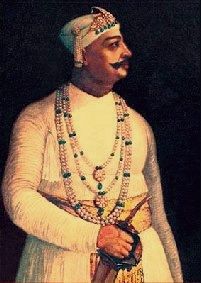Sikander Jah, Asaf Jah III facts for kids
Quick facts for kids Sikander Jah |
|||||
|---|---|---|---|---|---|
| Nizam-ul-Mulk | |||||
 |
|||||
| 6th Nizam of Hyderabad State | |||||
| Reign | 6 August 1803— 21 May 1829 | ||||
| Predecessor | Nizam Ali Khan | ||||
| Successor | Nasir-ud-Daulah | ||||
| Born | Mir Akbar Ali Khan Siddiqi 11 November 1768 Chowmahalla Palace (Khilwat), Hyderabad, Hyderabad State (now in Telangana, India) |
||||
| Died | 21 May 1829 (aged 61) Hyderabad, Hyderabad State (now in Telangana, India) |
||||
| Burial | Mecca Masjid, Hyderabad, Hyderabad State (now in Telangana, India) |
||||
| Spouse | Jahan Parwar Begum Fazilat-un-Nisa Begum |
||||
| Issue |
|
||||
|
|||||
| Father | Nizam Ali Khan, Asaf Jah II | ||||
| Mother | Tinat-un-Nisa Begum | ||||
Sikander Jah, also known as Asaf Jah III, was an important ruler in India. He was the 6th Nizam of Hyderabad. He ruled from 1803 to 1829. He was born on November 11, 1768, in the Chowmahalla Palace in Hyderabad. His father was Asaf Jah II, who was also a Nizam.
Contents
Who Was Sikander Jah?
Sikander Jah's full official name was quite long! It included titles like Asaf Jah III, Nizam ul-Mulk, and Nizam ud-Daula. These titles showed his high position as the ruler of Hyderabad. He was a powerful leader during his time.
Sikander Jah's Family Life
Sikander Jah had several wives and many children. Two of his main wives were Jahan Parwar Begum and Fazilat-un-Nisa Begum. Jahan Parwar Begum was the mother of Mir Tafazzul Ali Khan and Namdar-un-Nisa Begum. Fazilat-un-Nisa Begum was the mother of Nasir-ud-Daulah and Mubarez-ud-Daulah. He also had several daughters.
Hyderabad Under Sikander Jah
During Sikander Jah's rule, some big changes happened in Hyderabad. The British had a strong presence in India.
The City of Secunderabad
A British military camp, called a cantonment, was set up near Hyderabad. This area was named Secunderabad after Sikander Jah. His son, Samsamadaula, helped his brother and nephew with defense matters. However, the state faced money problems during this time.
Sikh Soldiers Join the Army
An important person in the Nizam's court, Maharaja Chandu Lal, suggested something new. He recommended that Sikh soldiers join the Nizam's army. Because of this, over 1200 Sikh soldiers became part of the army. Later, in 1830, Maharaja Ranjit Singh sent more Sikh men. They helped build a special Sikh temple, called a Gurdwara, in Nanded.
Building a Temple for Everyone
Sikander Jah showed great respect for all religions. He built the Rambagh temple in Attapur, Hyderabad. What's more, he even went to the opening ceremony! This showed how well Muslims and Hindus lived together in Hyderabad State under his rule. He also gave land, called a Jagir, to the temple priest. This land helped pay for the temple's upkeep.
See also
 | Emma Amos |
 | Edward Mitchell Bannister |
 | Larry D. Alexander |
 | Ernie Barnes |

